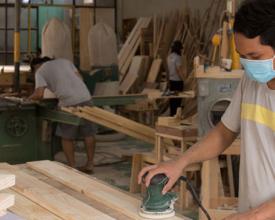DHA eNews – Trump Announces Tariff Investigation Into Furniture
Tariff discussions and litigation continue to dominate the news. President Trump's reciprocal tariffs were ruled unlawful by a U.S. appeals court. This tees up the issue to be decided by the U.S. Supreme Court.
Although the reciprocal tariffs have been in the headlines, decorative hardwood products have largely been exempted because of the ongoing Section 232 national security review of imports of wood products. DHA commented in support of tariffs on wood products in this review. President Trump recently hinted at an upcoming announcement on the Section 232 national security review of wood products when he posted about forthcoming furniture tariffs within 50 days. The wood products Section 232 review is on a stronger legal footing than the reciprocal tariffs, as it has undergone a well-documented process.
If you have questions or comments, contact me. I look forward to hearing from you.

Keith A. Christman, President

Last month, President Trump announced that the administration is conducting a "major Tariff Investigation on Furniture" imports into the U.S. that will be completed in the next 50 days. He appears to have been referring to the ongoing Section 232 national security investigation into imports of lumber, timber, and derivative products. DHA supports the Section 232 investigation, which began in March.
Last month, President Trump announced that the administration is conducting a "major Tariff Investigation on Furniture" imports into the U.S. that will be completed in the next 50 days. He appears to have been referring to the ongoing Section 232 national security investigation into imports of lumber, timber, and derivative products. DHA supports the Section 232 investigation, which began in March.
The U.S. Forest Service announced that it intends to rescind the 2001 Roadless Area Conservation Rule, which restricts timber harvesting on about 45 million acres of National Forest System lands. Comments are due by Friday, September 19. The rule should be finalized in late 2026.
German equipment manufacturers called for revisions and a two-year delay of the EU Deforestation Regulation (EUDR), stating that the complexity of the regulation could severely disrupt supply chains and harm European industry. The German Mechanical Engineering Industry Association described the law as "bureaucratic madness" and stated that implementing it would burden companies with impractical documentation requirements.
Alabama landowners won a decisive victory in August, as a federal judge ruled that the U.S. Fish & Wildlife Service had overreached when it declared more than 39,000 acres a "critical habitat" for the black pine snake, without providing credible evidence. The ruling sets an important precedent that requires federal agencies to support critical habitat designations with rigorous science and economic impact assessments.
A recent report by Earthsight stated that the RV industry is the largest consumer of tropical wood in the U.S., using an average of 500 giant trees every day. Three corporations make 86% of the RVs sold in the country. Investigators found plywood from deforestation in Indonesia in the supply chains of all three corporations.
The American Hardwood Export Council analyzed the likelihood of EU retaliatory tariffs in its most recent Europe Market Report. On August 5, the EU announced that retaliatory tariffs on U.S. hardwoods would be delayed by six months. As of right now, no tariffs are levied on U.S. hardwood products; the full details are in AHEC's report.
Wood production, processing, and export is one of Vietnam's top industries. After the U.S. imposed reciprocal duties of 20% on imports from Vietnam and 40% on any imports involving illegal transshipment, and launched an investigation into Vietnam's wood and furniture imports, the country is reassessing its strategy. "These moves are creating prolonged uncertainty for the wood processing industry," said a representative of the Vietnam wood industry.
Sales of U.S.-made cabinets continue to decline. Year-to-date sales volume fell by 14.4% through July, and the value of cabinet sales dropped by more than 6%. July volume was down by more than 14% vs. June.
U.S. working forests are growing more than enough wood to meet demand. Private working forests grow 53% more wood than is harvested each year. The problem isn't a lack of wood, it's a lack of demand and manufacturing capacity to process it. As more mills close or scale back, rural communities and private forest owners have fewer options for selling their timber.
The U.S. Department of Agriculture will invest more than $8 million in five new projects to reduce wildfire risk, protect water quality, and improve forest health. The $8 million investment is in addition to $32 million the USDA has invested in 24 projects, each three years long, managed by the U.S. Forest Service and Natural Resources Conservation Service.
Researchers documented the devastating impacts of hurricanes on forests and the wood processing industry across the southeastern U.S. In the areas hit hardest by Hurricane Michael, forest inventory collapsed to less than 23% of previous levels. Hardwood prices plummeted by 77%, pine prices fell by 9%, and pulpwood prices dropped by 6% as salvage logging flooded supply chains, wreaking havoc on the forest products industry.
What are the 10 best U.S. national parks to visit to see gorgeous fall foliage?





